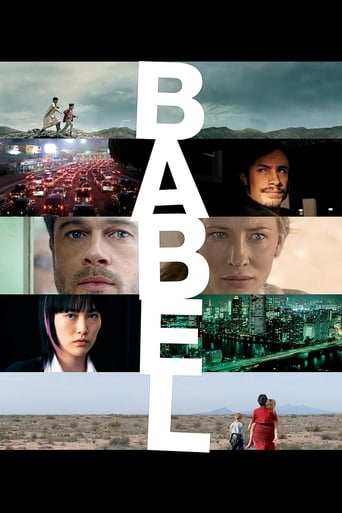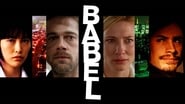ElMaruecan82
... said Alejandro Inarritu while contemplating the wall between America and Mexico and the human flows circulating from one side to other, legally or not… yet all the borders in the world wouldn't amount to a hill of beans if people decided to sit and talk, to take time to understand each other. To quote another director, it was Jean Renoir who thought-provokingly said during a friendly chat with actor Michel Simon that laziness was underrated, because civilized people, rather than acting, preferred talking and make the world a better place, with words as a first step.And this is how "Babel", as magnificent a title as it is, is misleading; the Biblical episode symbolized the human hubris and its divine punishment: dividing people by languages. However, those who populate the film are ready to overcome these barriers, out of fraternal impulses, curiosity and sometimes, necessity. This hymn for universality is even more powerful because it doesn't ignore the specificity of the ground it walks on, whether Moroccan mountains, the urbane belly of a Japanese metropolis or a small Mexican town across the desert, Inarritu explores each identity, each form of expression, not to say that we're all the same, but so we gather the certitude of our own differences before concluding that we're still the same… after all.There comes a point in "Babel" where we stop seeing the children of a goat shepherd, or the deaf daughter of a Japanese businessman (Rinko Kikuchi) or two big stars playing American tourists (Brad Pitt and Cate Blanchett) or a Mexican nanny (Adriana Barraza) taking her employers' children to her son's wedding. Indeed, we stop labeling them from their origins, we only see two brothers victim of childish temptations, the tragedy of three fathers, deafness as a convenient alibi while there's more to make communication difficult. We see a woman who worked hard all her life and decided to please herself just for once and compromising everything she built, and we see a couple trying to find to overcome a marital crisis before Karma intervenes through an accidental bullet.Yes, there's a moment where we embrace the poetry of Inarritu, the realization that the air we breathe is the same, the way we break down after seeing a loved one bleeding to death, the way our pain can be either silent or tearful, the way we gaze at the sky with the same amazement, the way we're all humans… there's a moment where the Mexican woman, after wandering for hours in the middle of the desert, sees a car and starts running, hysterically shouting, she doesn't scream in Mexican, she's just letting her heart vent the last gasps of desperate energy. The film is full of countless moments where to identify the existence of a universal language: we all nod and shake our head the same, and sometimes, a foreigner is closer than a compatriot. Actually, many tragedies in the film occur because of secrets, silences and misunderstandings within the same culture.Another marvel of Hyperlink Cinema, "Babel" doesn't rely on a complex non-linear storytelling where you only get everything at the end, the stories are simple and could have made powerful dramas in their own right, but they all converge toward the same recognition of universality. It's a powerful journey into our own humanity, a movie one should watch before stating that there are some countries deserving to be invaded. The day, there'll be "Babel" about North Korea or Iran, maybe people will start to act reasonably. Because like for human relationships, sometimes, more than love, more than respect, understanding is the key element, understanding someone is like learning empathy. You can't bomb a country if you're empathetic, you can't make a terrorist attack either. I called the film universal, it's more than that: it's humanist and it's essential.And after watching it, I wanted to know more about the project, convinced that the finished result was as fascinating as the journey that made it. And yes, the making-of provided many additional elements to understand the complexity of human language, that could have made a great sequel to the film. There were three moments that stood out and they were set in my country, I loved that Inarritu was surprised to learn that one of the Moroccan extra (playing the old lady) didn't understand one word in Arabic, and they needed a Berber interpret, putting the Palestinian interpret in a tricky situation. Later, during a shootout, I saw the female interpret being upset and I knew it was reminding her of some memories. I didn't need explanation, her eyes said it all. Finally, during a rain, Moroccan crew men were singing under an umbrella and one of the assistants asked them if it was a song to stop the rain, they nodded and kept laughing. It was just a pop song from the 70's, well sometimes; we're entitled to our little private jokes.Because languages aren't only here to separate us, they reinforce us within a group and allow us to be best prepared to talk to the others, there's no "other" without a strong identity, and the efforts to overcome the languages also allow you to better understand the people, it's all about universal understanding but not at the expense of human diversity. Inarritu must have had troubles with Moroccan language but when he embraced the two kids at the end of the shooting, he didn't need any word to understand their grief, and didn't find any to console them. Understanding, emotion and pain…. that image, both sad and beautiful, spoke a thousand words.Inarritu made a timeless and universal movie, establishing Cinema as an art-form that transcended the barriers of languages and culture. Maybe more than ever, we need movies like "Babel". If the Academy wasn't busy giving a sympathy Oscar for Scorsese, they would have acknowledged the cinematic importance of "Babel" and its incomparable beauty.





